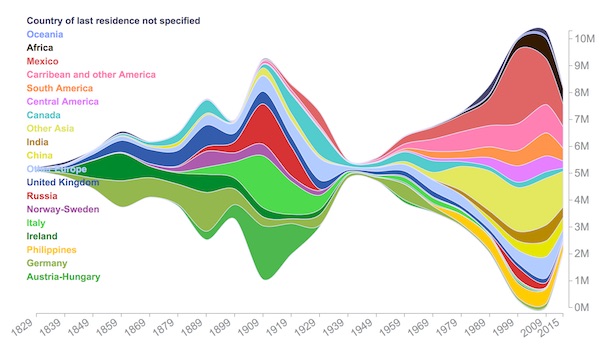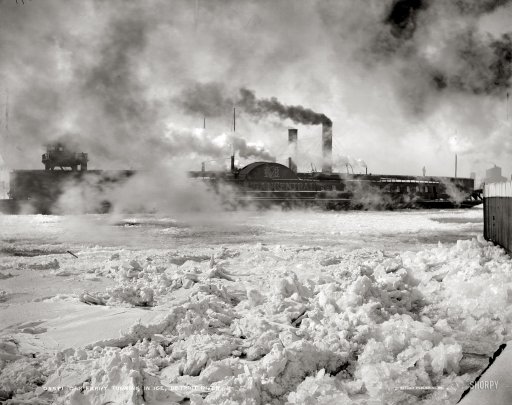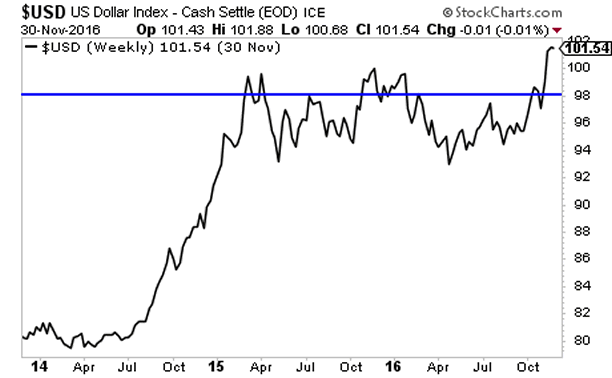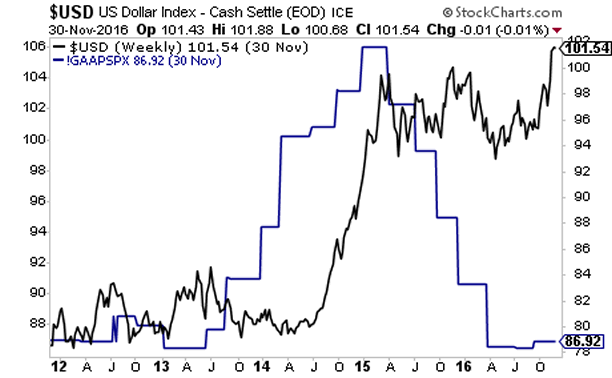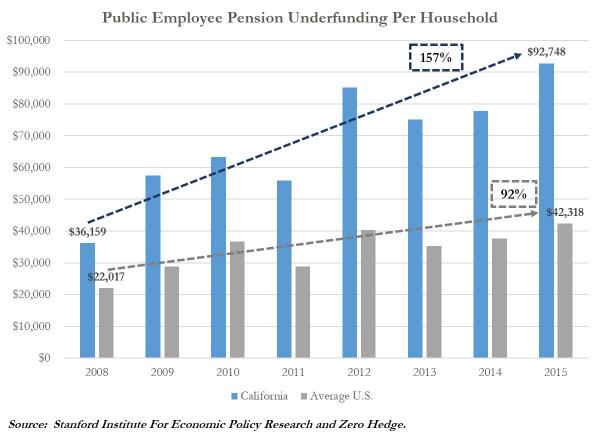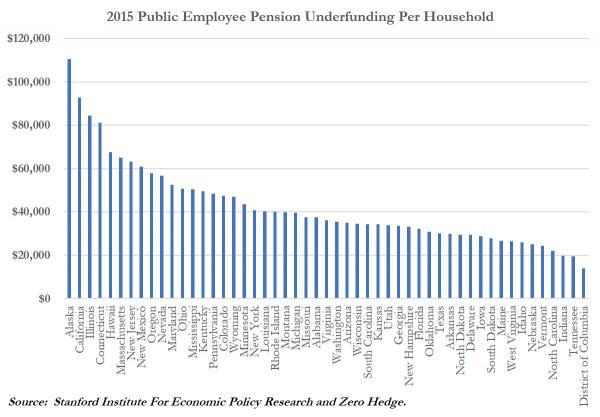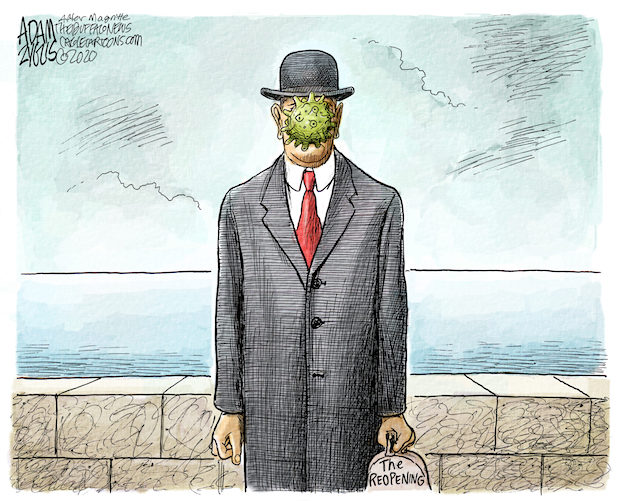
Adam Zyglis The son of man May 19 2020

Global new cases in past 24 hours: 107,743
New cases in:
• US + 23,591
• Russia + 9,434
• Brazil + 21.461
• India + 6,568
• Chile + 4,726
New deaths in past 24 hours:
• US + 1,260 (total deaths 97,655)
• Russia + 139
• Brazil + 1,034
• Spain + 688
• UK +351
• Mexico + 337

https://twitter.com/SteveGuest/status/1263901535462928386

• Cases 5,326,230 (+ 107,743 from yesterday’s 5,218,496)
• Deaths 340,383 (+ 5,314 from yesterday’s 335,069)

From Worldometer yesterday evening -before their day’s close-
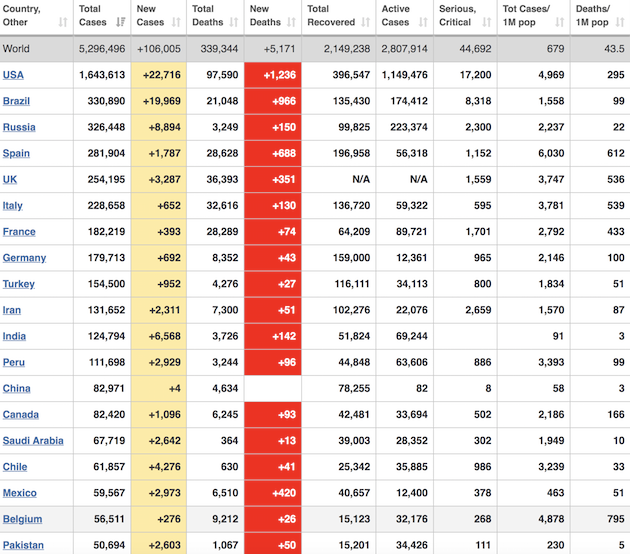
From Worldometer
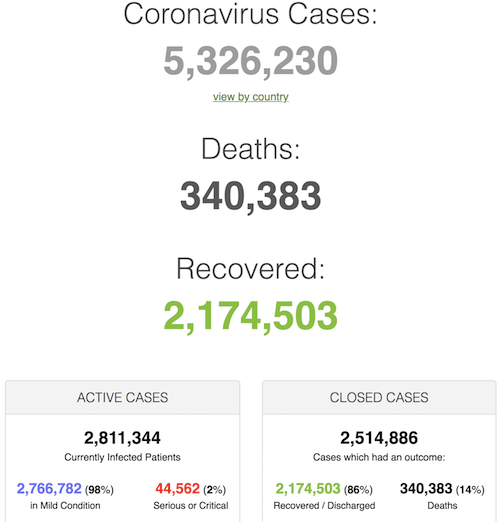
From SCMP:
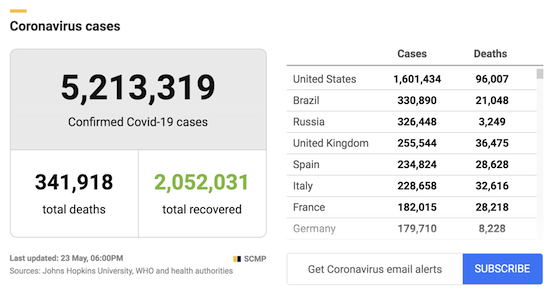
From COVID19Info.live:


Now that their lockdowns end, the US and UK take measures they should have when they started. The cart and the horse.
How is this not insane? During the lockdowns, US airlines have kept flying everywhere, and people have entered the UK without even being checked (an official policy).
Now that the virus is solidly embedded in the home population, they start acting to prevent it from embedding itself in the population.
• US Grants Tentative OK For 15 Air Carriers To Cut Service To 75 Airports (R.)
The U.S. Transportation Department said late on Friday it had granted tentative approval to 15 airlines to temporarily halt service to 75 U.S. airports because of the coronavirus pandemic. Airlines must maintain minimum service levels in order to receive government assistance but many have petitioned to stop service to airports with low passenger demand. Both United Airlines and Delta Air Lines won tentative approval to halt flights to 11 airports, while JetBlue Airways, Alaska Airlines and Frontier Airlines were approved to stop flights to five airports each. The department said all airports would continue to be served by at least one air carrier.
The Transportation Department said objections to the order can be filed until May 28. U.S. air carriers are collectively burning through more than $10 billion in cash a month as travel demand remains a fraction of prior levels, even though it has rebounded slightly in recent weeks. They have parked more than half of their planes and cut thousands of flights. The department has previously granted airlines waivers to cancel some additional flights and denied others. On May 12, the department said it would allow carriers to halt flights to up to 5% of required destinations.

Getty

Millions of travelers since January, and 100,000 air passengers alone from April 1-26, have entered the UK unhindered. No More! We have all the virus we need!
• UK Confirms 14-Day Quarantine Post-Travel (Y!)
The UK government confirmed in a statement that it will put in place a 14-day period of quarantine for anyone that lands on British soil in a bid to prevent the spread of coronavirus. The move, which was announced at the government’s daily press briefing, will be a huge blow for the airline industry that is predicted to lose $314bn this year, according to the latest prediction from the International Air Transport Association (IATA). That number is still 25% more than previously forecasted. This is also due to a 55% drop in 2020 passenger revenue compared with last year.
Home secretary Priti Patel confirmed at the daily coronavirus briefing from Downing Street on Friday that alongside the 14-day quarantine, those under that lockdown could be contacted regularly throughout this period to ensure compliance. “As the world begins to emerge from what we hope is the worst of the coronavirus pandemic, we must look to the future and protect the British public by reducing the risk of cases crossing our border,” she said in a statement. “We are introducing these new measures now to keep the transmission rate down and prevent a devastating second wave. “I fully expect the majority of people will do the right thing and abide by these measures. But we will take enforcement action against the minority of people who endanger the safety of others.”

When a ‘pivotal’ study is released on a Friday at 6pm, you know something’s wrong. But we still see headlines today like:
“Gilead’s drug works best in COVID patients on oxygen” and “Anti-viral drug ‘remdesivir’ effective against coronavirus, study finds”.
Remdesivir doesn’t work. It may have a little effect on people who already get oxygen, but that’s it. It doesn’t cure a thing.
There’s a Chinese study out on a drug with the great plus that it hasn’t killed anyone in phase 1 testing.
That is the new standard. All investors should move in! This could be the one!
• Remdesivir Study Finds Mortality Too High For Standalone Treatment (ZH)
… According to a pivotal study published in the New England Journal of Medicine late on Friday, Remdesivir, which was authorized to treat Covid-19 in a group of 1063 adults and children (split into two groups, one receiving placebo instead of remdesivir) who need i) supplemental oxygen, ii) a ventilator or iii) extracorporeal membrane oxygenation (ECMO), only significantly helped those on supplemental oxygen. Meanwhile, and explaining the 6pm release on a Friday, the study also found no marked benefit from remdesivir for those who were healthier and didn’t need oxygen or those who were sicker, requiring a ventilator or a heart-lung bypass machine.
The NEJM, almost apologetically, stated that “the lack of benefit seen in the other groups might have stemmed from a smaller number of patients in each group.” Still, as a result of the partial benefit for patients in the supplemental oxygen group, the study from the National Institute of Allergy and Infectious Diseases was evaluated early and led to the authorization of remdesivir before the full trial was completed. Our findings highlight the need to identify Covid-19 cases and start antiviral treatment before the pulmonary disease progresses to require mechanical ventilation.
A visual representation of the outcomes is below; it shows that whereas there was a modest benefit only to patients who were receiving oxygen, the results were statistically insignificant vs placebo for patients not receiving oxygen, while in a surprising twist patients on high-flow oxygen or mechanical ventilator/ECMO did modestly better in the placebo group than those taking remdesivir. Also, the overall results showed a very modest, but not statistically significant improvement in the remdesivir group vs placebo. [..] Another disappointment: the study found that overall “mortality was numerically lower in the remdesivir group than in the placebo group, but the difference was not significant”, in other words the alleged “miracle drug” has largely the same effect as a placebo in terms of overall disease mortality.
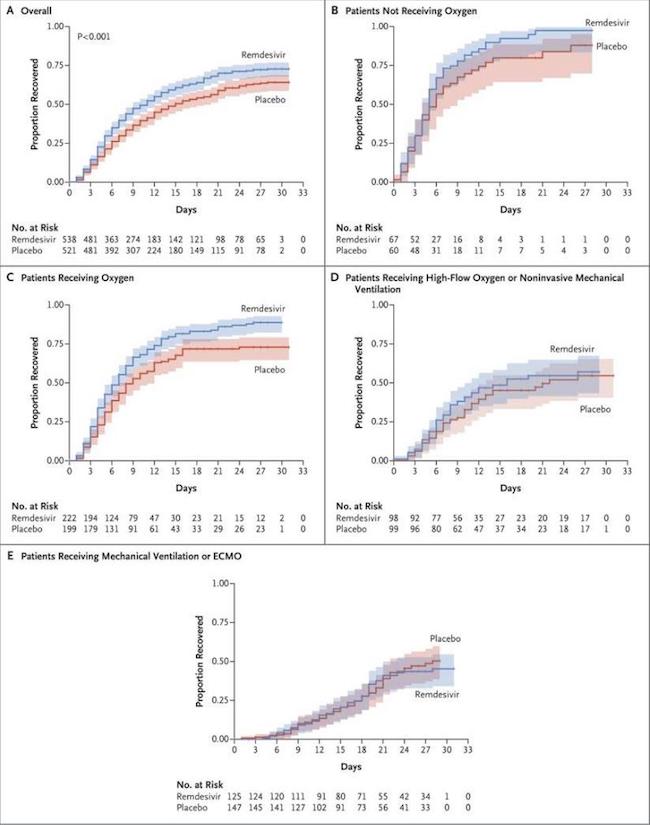

It looks like advertizing gone wrong.
• NIH Trial: Redesivir Works Best In COVID Patients On Oxygen (R.)
The U.S. National Institutes of Health (NIH) on Friday said that data from its trial of Gilead Sciences Inc’s (GILD.O) remdesivir show that the drug offers the most benefit for COVID-19 patients who need extra oxygen but do not require mechanical ventilation. The peer-reviewed data was published in the New England Journal of Medicine. The trial, for which final results are still trickling in, showed that recovery time for patients given remdesivir was shortened by four days, or 31%, compared to placebo patients. The biggest benefit was seen in patients who were sick enough to need supplemental oxygen, but were not on a ventilator. The data detailed in the journal is similar to early results that the NIH released last month from the study, which began in February with 1,063 participants in 10 countries.
Researchers now calculate that after follow up, 7% of patients given remdesivir will have died, compared with 12% in the placebo group, but they said the difference in the death rate was not significant. “Our findings highlight the need to identify COVID-19 cases and start antiviral treatment before the pulmonary disease progresses to require mechanical ventilation,” the researchers wrote. They noted that “given high mortality despite the use of remdesivir,” it is likely that the antiviral drug would be more effective in combination with other treatments for COVID-19, the respiratory illness caused by the novel coronavirus. Gilead said it expects results from its own study of remdesivir in patients with moderate COVID-19 at the end of this month.

Chuck Schumer is only interested because he can smear Trump. That the VA employs thousands of doctors makes no difference. They are all wrong.
• US Veterans Agency Has Given HCQ To 1,300 Coronavirus Patients (R.)
The U.S. Department of Veterans Affairs (VA) has treated 1,300 coronavirus patients with the malaria drug hydroxychloroquine, which a study has tied to an increased risk of death, according to a document released by a Senate Democrat on Friday. Senate Democratic Leader Chuck Schumer, who received the information from the VA in response to questions he submitted on the issue, said he was “deeply troubled” by the data. President Donald Trump has long urged use of hydroxychloroquine against coronavirus and recently said he has been taking it himself, despite evidence that the treatment could be harmful.
A study published on Friday in the medical journal Lancet tied the drug to an increased risk of death in hospitalized patients with COVID-19, the disease caused by the novel coronavirus. In April, doctors at VA itself also said hydroxychloroquine did not help COVID-19 patients and might pose a higher risk of death. The VA, which provides care to 9 million veterans, said that about 1,300 coronavirus patients who received the drug are among more than 10,000 COVID-19 patients it has treated.
It has also dispensed hydroxychloroquine to about 7,500 patients with other conditions including rheumatoid arthritis and lupus. The VA said it will continue to dispense the drug under the guidelines of the Food and Drug Administration. In answer to a question from Schumer, the VA said it was not pressured into using hydroxychloroquine by the White House, the Department of Health and Human Services or any other federal agency. “VA, like so many medical facilities across this nation, is in a race to keep patients alive during this pandemic, and we are using as many tools as we can,” the VA told Schumer.

Sure, younger population. But more than that, no health care systems, no ways to keep track of infected or dead, let alone with what.
Different path alright.
• COVID19 ‘Taking Different Path In Africa’, Says WHO (G.)
There had been apocalyptic forecasts for the potential impact of the coronavirus pandemic in Africa. On Friday evening, after the 100,000th case was reached, the World Health Organization’s Africa office circulated a note saying that it now seemed clear that the pandemic “appears to be taking a different pathway in Africa.” The note continued: Case numbers have not grown at the same exponential rate as in other regions and so far Africa has not experienced the high mortality seen in some parts of the world. Today, there are 3,100 confirmed deaths on the continent. By comparison, when cases reached 100,000 in the WHO European region, deaths stood at more than 4,900.
Early analysis by WHO suggests that Africa’s lower mortality rate may be the result of demography and other possible factors. Africa is the youngest continent demographically with more than 60% of the population under the age of 25. Older adults have a significantly increased risk of developing a severe illness. In Europe nearly 95% of deaths occurred in those older than 60 years. WHO also noted that African governments swiftly imposed restrictive measures on their populations in an attempt to contain the spread of the disease. However, it also said that despite “significant progress in testing”, rates of testing remain low in comparison to other regions.
It insisted that, despite the relatively low number of cases, “the pandemic remains a major threat to the continent’s health systems”. Now that countries are starting to ease their confinement measures, there is a possibility that cases could increase significantly, and it is critical that governments remain vigilant and ready to adjust measures in line with epidemiological data and proper risk assessment.

Peru has it bad.
• Peruvian President Extends Nationwide Lockdown Through June 30 (CNN)
Peruvian President Martin Vizcarra announced Friday that a national state of emergency, which includes mandatory social isolation measures, will be extended through June 30. He announced that “a national state of emergency is being declared from Monday, May 25 until June 30, including obligatory social isolation, quarantine, due to the grave circumstances that affect the life of the nation due to Covid-19,” according to state news agency Andina. Vizcarra first declared a nationwide state of emergency, which included mandatory self-quarantine and closed the country’s borders, on March 15. With the current extension, Peru will be under a state of emergency for at least three and a half months.

“On the first night, the word “hunger” was projected onto one of Santiago’s tallest buildings.”
• Chileans Rediscover Community Kitchens As Coronavirus and Hunger Bite (R.)
Poor neighbourhoods in the Chilean capital Santiago have seen a resurgence in the use of community kitchens once prevalent in the darkest days of dictatorship, as coronavirus shutdowns put pressure on jobs and send thousands into poverty. With winter approaching and temperatures chilling, canteen-style operations provide plates of hot food to those with dwindling incomes or nothing at all. They are organized by neighbors, local leaders and councils, who donate money or food. “My people are getting desperate, they have nothing to eat so we asked for help and as always, the people answered,” Sandra Cariz, the president of a community association, told Reuters in the Puente Alto suburb of Santiago on Friday.
The kitchens come alongside a growing number of drives circulating on social media for food, money and clothing donations. Chile has about 62,000 coronavirus cases and 600 deaths. Its economy has taken a hit unlike anything since the 1980s, government officials have said, when almost half of Chileans lived below the poverty line and the country was rocked by protests against Augusto Pinochet’s regime. When the coronavirus hit in March, Chile was just recovering from intense social protests over inequality which included arson attacks and looting. Protests restarted this week, with skirmishes between police and people denouncing the highest job losses in a decade. On the first night, the word “hunger” was projected onto one of Santiago’s tallest buildings.

Uber.
• Car Rental Giant Hertz Files For Bankruptcy (Solomon)
Hertz Global Holdings on Friday eveing filed for Chapter 11 bankruptcy protection as large debts and 700,000 vehicles mostly idled by the pandemic brought the car rental giant to its knees. The Florida-based company, which listed more than $24 billion in debt, took the action in a Delaware bankruptcy court in an effort to avoid permanent closure and a liquidation of its fleet. The company said it had $1 billion in cash to keep operating on a limited basis while it negotiated with its lenders and vendors. Its financial problems became apparent last month when it missed a round of payments. Hertz is the nation’s second largest car rental agency and boasts the brands Hertz, Dollar, Thrifty, and Firefly.

“As in any extinction event, it will be the smaller organisms that survive and eventually thrive and that’s how it will go in the next edition of America..”
• This Sucker Is Going Down (Kunstler)
It was only a few decades ago that Walmart entered the pantheon of American icons, joining motherhood, apple pie, and baseball on the highest tier of the altar. The people were entranced by this behemoth cornucopia of unbelievably cheap stuff packaged in gargantuan quantities. It was something like their participation trophy for the sheer luck of being born in this exceptional land, or having valiantly clawed their way in from wretched places near and far – where, increasingly, the mighty stream of magically cheap stuff was manufactured. The evolving psychology of Walmart-ism had a strangely self-destructive aura about it. Like cargo cultists waiting on a jungle mountaintop, small town Americans prayed and importuned the gods of commerce to bring them a Walmart.
Historians of the future, pan-frying ‘possum cutlets over their campfires, will marvel at the potency of their ancestors’ prayers. Every little burg in the USA eventually saw a Walmart UFO land in the cornfield or cow-pasture on the edge of town. Like the space invaders of sci-fi filmdom, Walmart quickly killed off everything else of economic worth around it, and eventually the towns themselves. And that was where things stood as the long emergency commenced in the winter of early 2020, along with the Covid-19 corona virus riding shotgun on the hearse-wagon it rolled in on. We’re in a liminal, transitional moment of history, like beach-goers gawking at the glassy-green curve of a great wave in the throes of breaking. Such mesmerizing beauty!
Alas, most people can’t surf. It looks easy on TV, but you’d be surprised at the conditioning it takes, and Americans are way, way out of condition. (All those tattoos don’t give you an ounce of extra mojo.) And so, in this liminal moment, the people still trudge dutifully to the Walmarts with their dwindling reserves of cash money to get stuff, going through all the devotions that we took for granted before the wave welled up and threatened to break over us. Which is happening. Despite all the fake-heroic blather from the Federal Reserve, from Nancy Pelosi, from Mr. Trump and Mr. Mnuchin – from everybody in charge, to be really fair – and in the immortal words of another recent president — this sucker is going down. Specifically, what’s going down is the aggregate of transactions we call “the economy.”
[..] As in any extinction event, it will be the smaller organisms that survive and eventually thrive and that’s how it will go in the next edition of America, whether we remain states united or find ourselves organized differently. Accordingly, the giants must fall. When the communities of America rebuild, it will be the thousands of small activities that matter, because they will entail the rebuilding of social capital as well as exchanges that amount to business. Social capital is exactly what Walmart and things like it killed in every community from sea to shining sea. People stopped doing business with their neighbors. It took a cataclysm for them to finally notice.

On average once every decade?!
• Argentina Set For Default As Bondholders Reject New Terms (G.)
Argentina is on course for a technical default on its government borrowing on Friday as the country continues to hold talks with international investors over plans to restructure its debts. Financial investors said they expected the country to miss $500m (£410m) in interest payments on its borrowing, according to the Reuters news agency, as the government tries to renegotiate its borrowing before a 2 June deadline. With the economy in recession even before the coronavirus outbreak and spiralling inflation, Argentina has about $65bn in debt owned by overseas investors, which both the state and its creditors believe is unsustainable. The government has asked bondholders to accept significantly lower interest payments on its debts and to defer payments until 2024. Investors had thus far rejected the terms proposed by president Alberto Fernández’s centre-left government, which came to power late last year.
This month, a group of leading economists including Thomas Piketty and the Nobel prize-winner Joseph Stiglitz urged bondholders to take a constructive approach to restructuring Argentina’s debts. They argued debt relief for the country would be “the only way to combat the pandemic and set the economy on a sustainable path”. A group of international investors – including Ashmore, BlackRock and AllianceBernstein – that hold about $16.7bn of Argentinian bonds said on Friday that they recognised the country was seeking a comprehensive deal, even though failure to pay would trigger a default, Reuters reported. Sarah-Jayne Clifton, director of Jubilee Debt Campaign, said that Argentina was right to demand a deep debt restructuring and to default if lenders did not accept a deal. “Reckless lending at high interest rates helped to create the current crisis, so lenders and speculators should share in the costs,” she said.

Oh, get serious.
• FBI Launches Internal Investigation Into Its Handling Of Flynn Case (JTN)
FBI Director Christopher Wray on Friday ordered an internal investigation into the bureau’s handling of the Michael Flynn case, just two weeks after the Justice Department declared that it was dropping the case against him and that federal investigators had no standing to interview the general in early 2017. Wray “today ordered the Bureau’s Inspection Division to conduct an after-action review of the Michael Flynn investigation,” the FBI announced on Friday. The Inspection Division essentially functions similarly to an internal affairs office found in lower law enforcement agencies. Fox News reported on Friday that the bureau will seek to identify whether any current FBI officials “engaged in misconduct” during the investigation, as well as whether or not the agency can improve its investigation process moving forward.
The bureau “does not have the ability to take any disciplinary action” against former employees, the FBI’s statement said. Flynn’s plight has received new attention in recent weeks, starting with the stunning Justice Department announcement at the beginning of the month. Following the department’s decision, the judge overseeing the Flynn case, Emmet Sullivan, declined to immediately dismiss it per the recommendation from Justice, instead inviting an amicus curiae brief from retired Judge John Gleeson in support of continuing the case against the general.

Boy what a sh*tshow.
• FBI Opened Russia Probe On Third-Hand ‘Suggestion’ Of Collusion (JTN)
The FBI’s probe into whether the Trump campaign colluded with Russia was opened on a third-hand “suggestion” of wrongdoing and the thinnest of suspicions that illegal foreign lobbying had occurred, according to a declassified memo released Friday that shows agents immediately flagged the strong limitations of their evidence. The July 31, 2016 electronic communication that officially open the counterintelligence investigation codenamed Crossfire Hurricane was obtained by the conservative watchdog group Judicial Watch. It shows the criminal basis for opening the probe was suspected violations of the Foreign Agent Registration Act, but it did not identify a single episode that it said violated the law.
Rather it focused on a “suggestion” passed on by Australian ambassador Alexander Downer that Trump campaign adviser George Papadopoulos might be coordinating with Russia the release of damaging information about Hillary Clinton. Downer had heard the information about the Russians during a bar conversation in May 2016 from Papadopoulos, who had heard it two months earlier from a European professor who had heard it from Russians allegedly. The memo shows the case agent, Peter Strzok, expressed some doubts and reservations about the limitations of the evidence even as he opened the probe. The memo cited concerns about “suggestions from the Russians that they (the Russians) could assist the Trump campaign with the anonymous release of information during the campaign that would be damaging to Hillary Clinton.”
Papadopoulos “suggested the Trump team had received some kind of suggestion from Russia” that it had damaging information, the memo said. But Strzok’s memo immediately noted the limitations of the allegations forwarded from the Australians. “It was unclear whether he or the Russians were referring to material acquired publicly of through other means. It was also unclear how Mr. Trump’s team reacted to the offer,” the memo stated. Kevin Brock, the former chief of intelligence for the FBI, said the electronic communication did not meet the bureau’s rigorous standards for predicating the opening of a criminal or counterintelligence case. [..] Asked whether as an FBI assistant director he would have approved opening Crossfire Hurricane based on what was in the memo, Brock said: “Not in a millions years. I wouldn’t have approved it as a squad supervisor either. This would have set off alarm bells in any FBI field for not meeting our standards for a predicate.”

We try to run the Automatic Earth on people’s kind donations. Since their revenue has collapsed, ads no longer pay for all you read, and your support is now an integral part of the interaction.
Thank you.

I am trump2020 supporter
President @realDonaldTrump is donating this quarter's salary to @HHSGov to develop new therapies for treating and preventing Coronavirus. #coronavirus #Trump2020 #DonaldTrump @realDonaldTrump @WhiteHouse@PressSec pic.twitter.com/nqXHGRNjqn
— Mahendra ayalani (@realmayalani) May 22, 2020



HELENA BONHAM CARTER stars in this groundbreaking Cinema Quarantino Production DAS FONE HELL. At vast expense, filmed on two continents over what (seemed like) five years , this profound and heartbreakingly candid insight into Modern Life will shake you to the core (Pilates 101) pic.twitter.com/aVXCfvAyfd
— Sam Neill (@TwoPaddocks) May 23, 2020

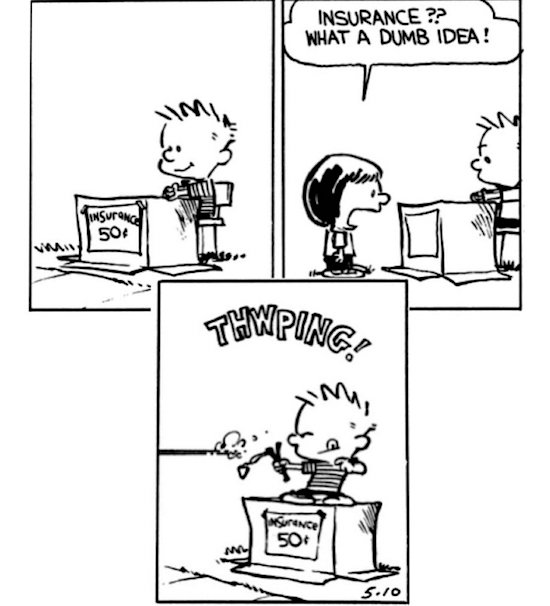

Support the Automatic Earth in virustime.



